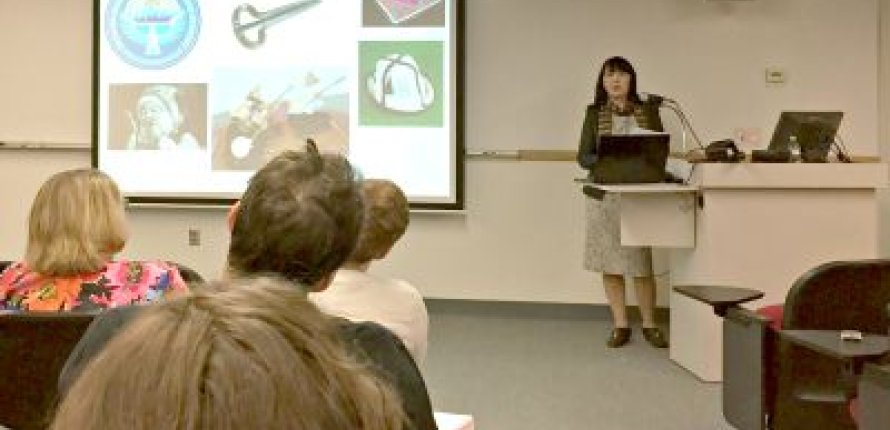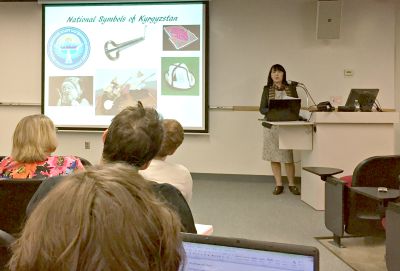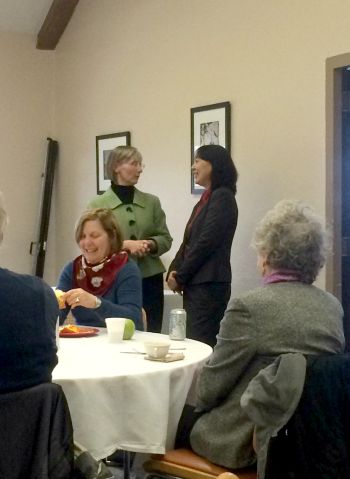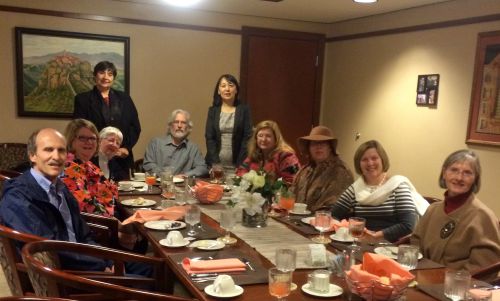The Impact of Poetry and Music on Women’s Identity

Kanykei Kalieva, Senior Lecturer at Kyrgyzstan-Turkey Manas University
2014-2015 Fulbright Visiting Scholar at the University of Massachusetts, Boston
Outreach Lecturing Fund participant at St. Bonaventure University
I t has been almost twenty-five years since the collapse of the Soviet Union, which resulted in an extensive transformation of economic, political, and social spheres of all five states of Central Asia. The transition to market based economies, parliamentary democracies, and the shift to globalization have had an enormous impact on the lives of all in the region, women in particular. As a Fulbright Visiting Scholar, I am researching/lecturing “How Poetry and Music Impact Female Identity: A Comparison of the United States and Post-Soviet Kyrgyzstan.”
t has been almost twenty-five years since the collapse of the Soviet Union, which resulted in an extensive transformation of economic, political, and social spheres of all five states of Central Asia. The transition to market based economies, parliamentary democracies, and the shift to globalization have had an enormous impact on the lives of all in the region, women in particular. As a Fulbright Visiting Scholar, I am researching/lecturing “How Poetry and Music Impact Female Identity: A Comparison of the United States and Post-Soviet Kyrgyzstan.”
In April, I was a keynote speaker for Women’s Day at St. Bonaventure University in New York state, discussing the impact of poetry and music on female identity in the post-Soviet Kyrgyzstan society and in the United States. This lecture was held as part of this year’s Women’s History Month celebration.
I presented two papers at St. Bonaventure’s 2015 Mary Devereux Lecture. The first was titled “How Poetry and Music Impact Female Identity in the US and in the Post-Soviet Kyrgyz Republic.” This lecture explored the importance of poetry and music to the Kyrgyz people and the ways in which it gives insight to the changes in the role of women in Kyrgyz and American society over time. My second lecture was titled “Kyrgyz Culture through the Eyes of Women Poets.” This lecture and PowerPoint presentation included audio, video, and photography.
Despite the common past, shared Soviet background and simultaneous independence, each country of the Central Asian region has tried to find its own answer to their national identity in the post-Soviet period. There are many significant differences in the traditions, customs, values, spiritual beliefs, and history of contemporary Kyrgyzstan. Throughout the twentieth century, Kyrgyz people experienced the process of formation and establishment of their own customs and traditions. Therefore, in order to understand and appreciate Kyrgyz culture and women’s identity development, it is important to identify the ways in how they preserve cultural, educational heritage in its original intact view, and expand it in line with the new developments of globalization and change their lives for better.
Kyrgyz nation’s identity is made up of every person’s own character combined with their family, people and social roots. As we know, identity, like culture, is ever changing. From the ancient times Kyrgyz traditions, national literature, folklore and art were defined as distinct from their neighboring countries. Therefore, to understand the Kyrgyz national identity and identity of Kyrgyz women in the modern period, it is necessary to review some of the characteristics, traditions, customs, national and natural heritages of Kyrgyz, values, beliefs, symbols, and events that have contributed to the country’s history.
The relationship between identity and poetry has been studied little in Kyrgyzstan. Preliminary findings of sociological research about Kyrgyz women have shown that independence from the Soviet Union and Kyrgyzstan’s transition to a market economy have changed the status of contemporary Kyrgyz women. The identity of the modern Kyrgyz woman is linked to three different pasts:
- pre-Soviet time, associated not only with illiteracy, no written script and isolation where women were treated as personal property with no rights, but also with famous women leaders, rich sources for oral poetry and folk music, and with ooz-komuz (mouth harp) which represents not only musical instrument, but philosophy of nomadic nation;
- Soviet time, when women became literate, poetry collections by women were published, but remained isolated from other countries of the world; however, during this time, Kyrgyzstan developed considerably in cultural, educational, and social life;
- post-Soviet time, when the first female president of Kyrgyzstan (from July 2010 to December 2011) Roza Otunbayeva’s role as president promoted the status of women in the country, and when female identity issues increased with the rise of religious, ethnic, regional, and domestic violence against women, forced marriages, and employment discrimination.
My lecture also touched on the works of Kyrgyz writer Chinghiz Aitmatov, the most celebrated representative of Kyrgyz national identity. A major theme in Aitmatov’s stories concern inequality among male and female members of traditional Central Asian society. Aitmatov’s works have been translated into more than 170 languages and, according to UNESCO, he is among the world’s most-read contemporary authors.
I would like to express my gratitude to the Fulbright Program, to St. Bonaventure University staff, and to Dr. Alva Cellini, director of the women’s studies program at St. Bonaventure for the invitation and organization of this visit and to university faculty staff and students for their welcome and interest in sharing cultures, including poetry and music. This lecture was a good resource for building new connections and promoting mutual understanding of two cultures. It is a new connection between Kyrgyz and American scholars which creates a new cross-cultural and feminist perspective and promotes understanding of the status of female identity through the arts in the United States and Kyrgyzstan societies.
would like to express my gratitude to the Fulbright Program, to St. Bonaventure University staff, and to Dr. Alva Cellini, director of the women’s studies program at St. Bonaventure for the invitation and organization of this visit and to university faculty staff and students for their welcome and interest in sharing cultures, including poetry and music. This lecture was a good resource for building new connections and promoting mutual understanding of two cultures. It is a new connection between Kyrgyz and American scholars which creates a new cross-cultural and feminist perspective and promotes understanding of the status of female identity through the arts in the United States and Kyrgyzstan societies.
